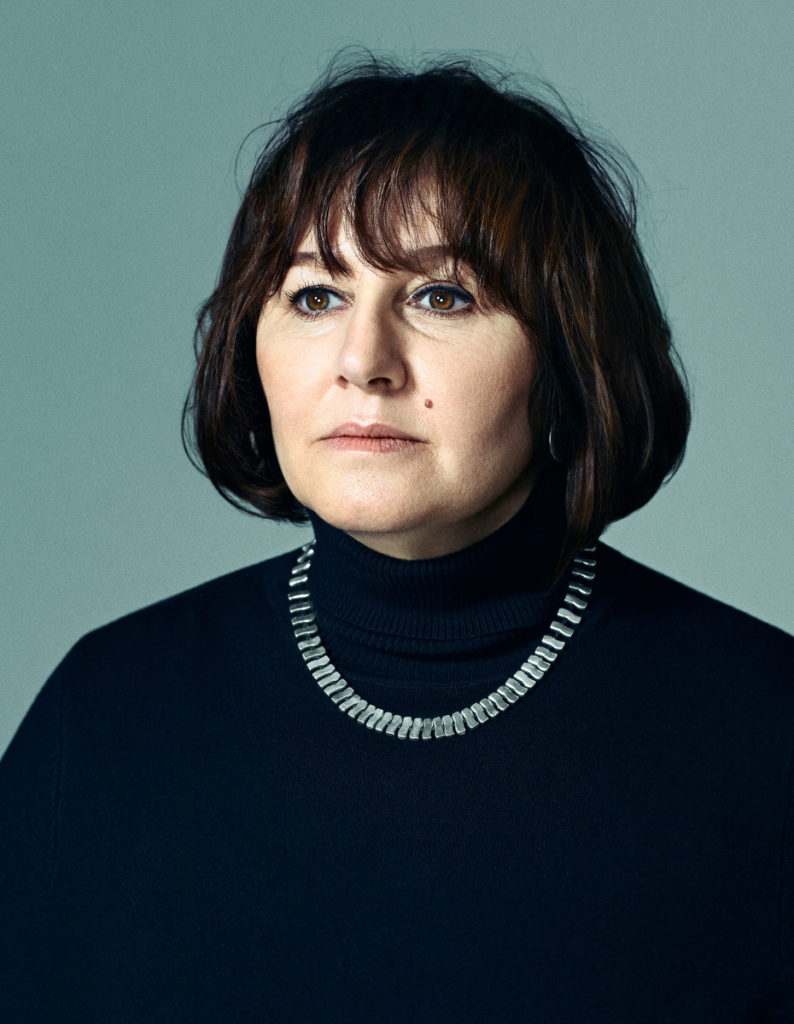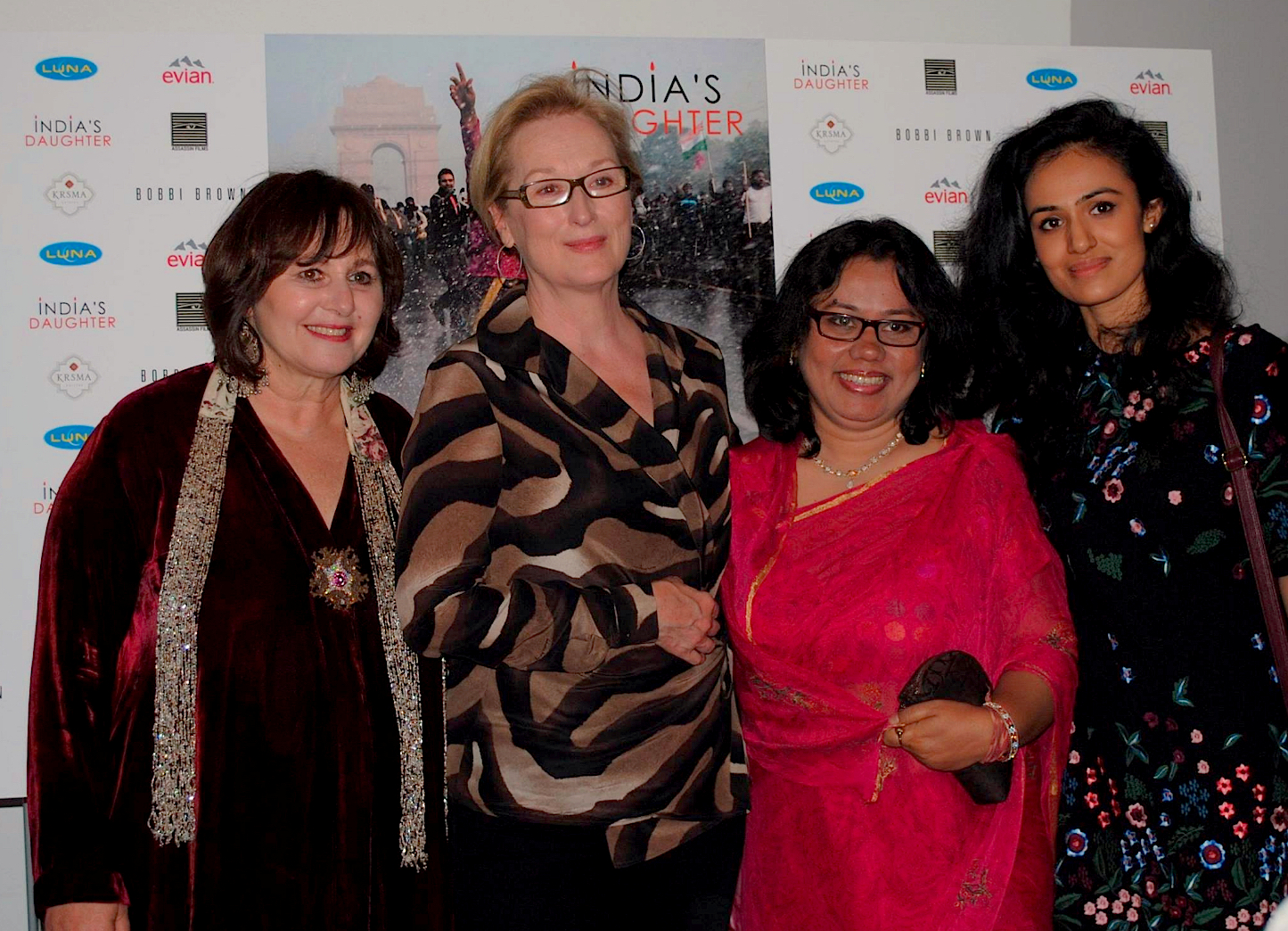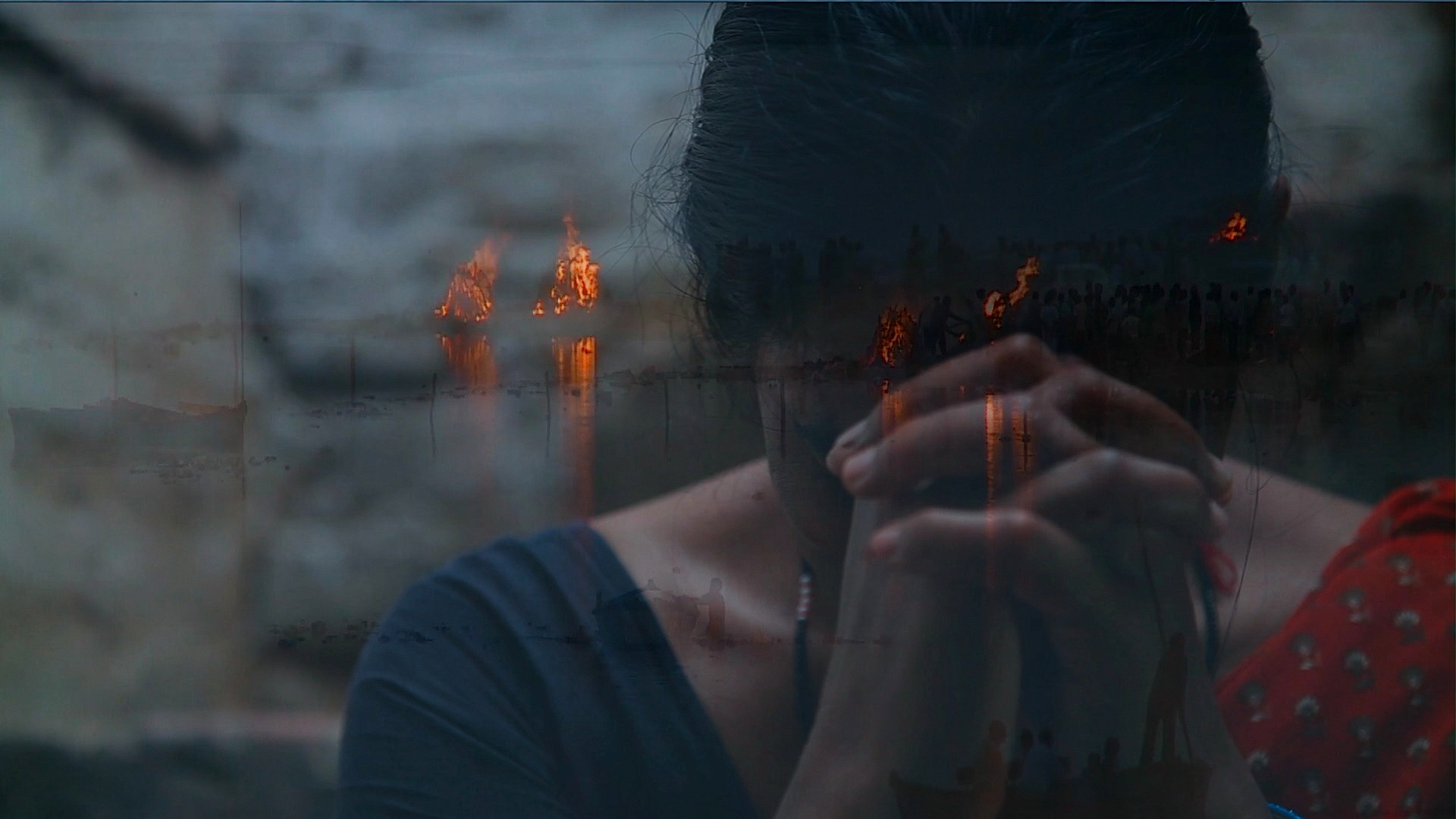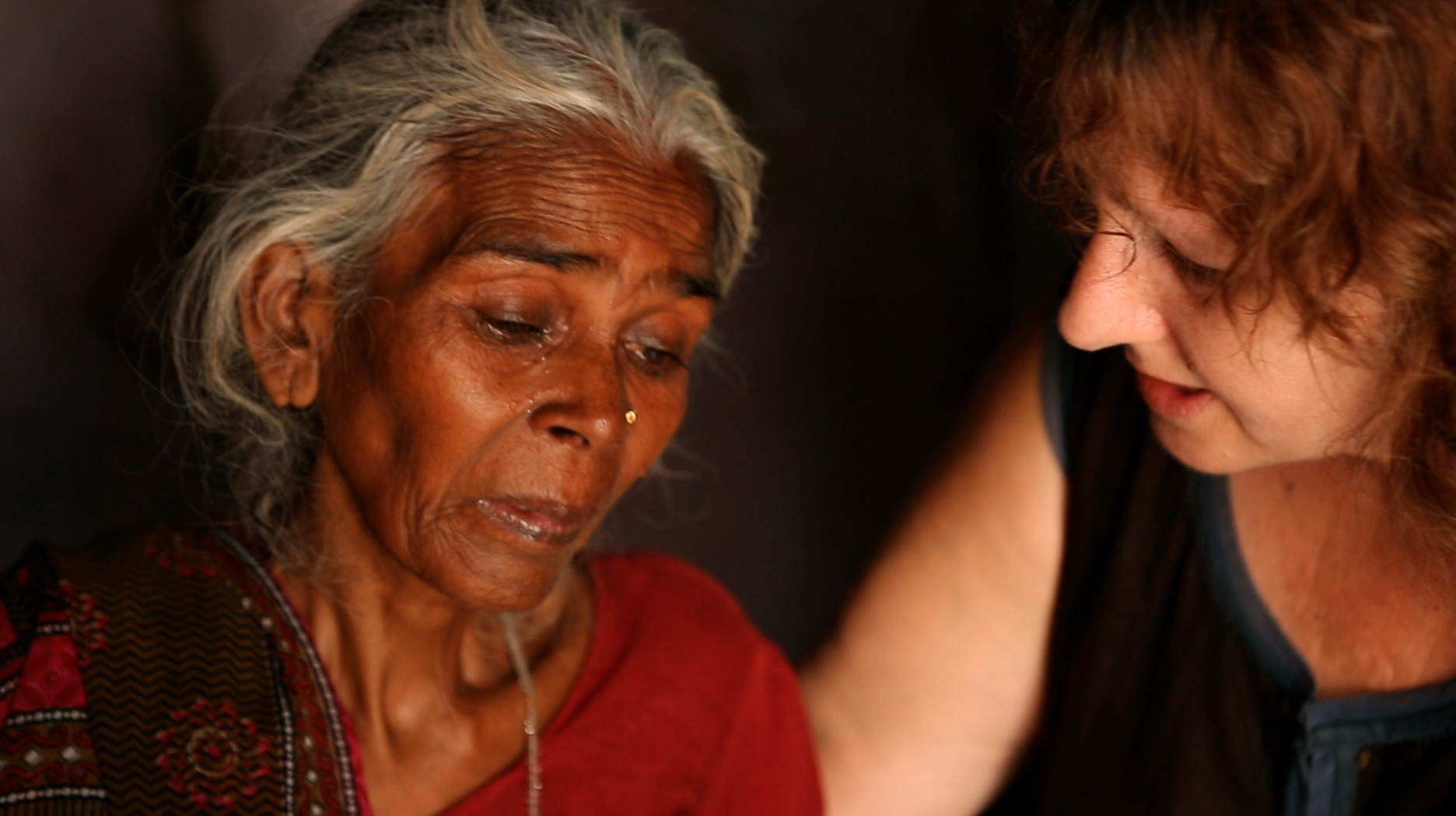
Leslee Udwin is a filmmaker (producer and director) and human rights campaigner and is no stranger to successfull campaigning films. Leslee’s first documentary feature and her debut as a director, multi-award winning “India’s Daughter”, has been critically acclaimed around the globe, provoked a global discussion about gender equality and violation of the rights of women and girls, and sparked a movement. Leslee’s initiative, Think Equal, aims to bring the missing third dimension to the world’s school-going population: human rights education in values, respect, empathy, on a compulsory basis and from the first day of a child’s journey at school. Leslee was voted by the New York Times the No. 2 Most Impactful Woman of 2015, and has been awarded the prestigious Swedish Anna Lindh Human Rights Prize.
Describe yourself in one word? What’s your biggest strength and one weakness?
One word that best describes me is ‘Fighter’. My biggest strength is being fearless. Biggest weakness: fiery. I say that advisedly because fiery is a double-edged sword. Fiery is also good, and I recognize that a lot of what I do is possibly fueled by anger. I think that anger can be a healthy motivator, but it’s not a healthy conduit or vehicle for diplomacy, and the kind of change that the world is used to making.
Congrats on the recent Peabody Award for India’s Daughter. What do these awards mean to you? How many have you won? It’s been a year since the documentary was released. What’s the one thing you wish you could change in this past year?
We are counting, so it’s 28. They are always wonderful to get. I get very happy every time I hear that we have won an award. The latest one, the Peabody is arguably the most prestigious documentary award that there is, it’s jury is mind blowing, and it is specifically dedicated to excellence in the documentary field. What they really mean to me is the ability to disseminate and reach out further. They are yet further endorsement that this film is important, that this film has been and can and is making a difference, and that is all that matters to me. I really mean that genuinely.

New York Premier of India’s Daughter. Leslee Udwin, Actor Meryl Streep, Editor Anuradha Singh and Associate Producer Riddhi Jha
The one thing I would change is the ban on the documentary. It’s a double edged sword because if I’m completely honest which I like to be, the ban did actually fuel the fire, and motor this documentary in a completely different way, but nonetheless. I would change that ban. Absolutely unjust and misguided, and the fighter in me, really hates that ban. I hate everything that ban stands for. I hate it so much that I would almost rather the documentary had less of a blazing trail which resulted from the ban, and I would happily work harder to get that documentary out there more and to the extent that it has gone out through my efforts, rather than by a completely unjustifiable and shameful, shameful, deeply shameful ban.
Some say that the documentary paints sexual violence as an Indian issue rather than a global one, and fear that it will perpetuate a “white-savior” attitude in foreign viewers. Your reply to that?
My reply to that is that whoever says that is being idiotic, actually. Because they are not looking at the film. If they would bother to actually look dispassionately and count empirically and scientifically, they will find that there are more positive role models of Indian men than negative. Number two, I am not in that film, my voice is not in that film drawing conclusions about whether this is an Indian issue or not. It is the actual participants in the story, it’s the members of that story and society themselves who are telling us what they think, or portraying the attitudes that are intrinsic to that society. If the documentary paints Indian society in a bad light, you want to go also and have an argument with Bajri Singh, Jyoti’s father for telling you that his brothers told him that he must be mad for even thinking of selling a field to educate girls. There’s a kind of hypocrisy in simply blaming the filmmaker for holding a mirror up to the truth that is actually being expressed by members of that society, and they are not white saviours. And the third thing, that there are many positive things said about India in this documentary. Many, how liberal, and tolerant a society it is. It gives us the kind of insight into the courage, and the moral, resplendent moral responsible attitude of Indian feminists who were against the death penalty. There is so much positive said, so if this were a film whose aim it was, or whose objective it was to paint a negative picture of Indian society, believe me those things would have been left out.
The most important thing – at the end of this film, we have this incredibly moving, heart rending beat where the film goes back to the mother and reminds us of what we have lost here.

The mother of Jyoti Singh, a woman who was brutally gang raped on a New Delhi bus in 2012, Courtesy of Assassin Films
The punctuation mark of the whole film is that role call of global statistics, which tells us a horrific problem the world over. And it doesn’t of course list every country because we have to be sitting there for half an hour, but it lists enough countries for us to understand that this is a pandemic that is global. It’s by no means an India centric problem. That comment is coming from a misplaced, and I think erroneous, and selfish if I am honest, sense of one’s own image. One should never care more about one’s image than one cares about the conditions of one’s women and girls, or children. One has to get priorities right, it is an appalling indictment to be focused on what they say about me then what does this say? Is there truth in this? And nowhere is it saying that this only exists in India. Wherever it happens it is to be deplored, and it must be changed. We all have to stand up and be counted.
I think what some people question is if this is such a global problem, why was only India shown in it, or why did you choose to interview only this particular rapist, and not other rapists across the world, if it was really global?
Very simply, and I said it, and I say it at every panel discussion, and every Q&A I ever give because it is the absolute truth. The thing that made me go to india and make this film, was not the rape. It was the promise of change, it was the protests, it was falling in love with the Indian men and women, who I had already been in love with frankly for fourteen years, I’ve had a very deep, very loving relationship with this country. It was falling in love with those spirited, beautiful human being who poured out on the streets in unprecedented ways that I had never seen before. I remember as if it was yesterday, that thought striking me between the eyes – “My God in all my life I have never seen any other country stand up with so much admirable or inspiring generosity of passion, or commitment to change. I was overwhelmed by it, that’s why I went to India, that’s why I made this film. I always say, if those protests had happened in any other country, about any other issues that relates to women. I would have gone to that country and made a film there about the case that sparked those protests.
Here is the other thing, those people who say why didn’t I include statistics within the body of the film, well here’s this story of this rape in Delhi, and here’s this story of this rape in the Congo, and here’s this story of this rape in the U.S., and here’s this story of this pedophile in the U.K. because there’s no power in a film like that. A film has to be story specific, films are stories. People who say that simply don’t understand the mechanism of what a film is, and specifically what a campaigning film is. I would write a pamphlet and not make a film if I wanted to draw attention to specific case. A film has to be a focussed, unified, powerful story. A single narrative. That’s just the way it is.
When you set out to make India’s daughter what was your goal and did you achieve it? Would you have done anything differently? One lesson you learnt from the whole experience?
My goal was to make a campaign film that amplified the cry for change and yes I believe I have achieved it, and I am achieving it. I will continue to achieve it. This is an ongoing process, this isn’t about just lets have a conversation about this, this is about let’s continue to have a conversation, let us continue to demand that change until we are given the respect that we deserve as half, at least of the population of the world. We as women, and girls, are literally the last bastion of injustice, and violation of human rights and crimes against humanity that are simply ignored and trodden over.

Mother of the rapists and Leslee Udwin, Courtesy of Assassin Films
The biggest lesson I learnt was that rape isn’t the disease, violence against women isn’t the disease, nor is sex selection, nor is child marriage, the disease is a mind-set. That mind-set is one that oppresses both men and women, we are all programmed, we have all been programmed. I tell you, if I hadn’t had the privilege of sitting in front of those rapists for 31 hours, including the one rapist who wasn’t in this case but had raped a 5 year old girl. If I had not been able to experience with my own eyes, and my own senses that these men are not monsters but are programmed, I would never have known. I would have continued to labour under the illusion as many people in the world do that these are just monsters, rotten apples in the barrel, they are abhorrences of nature, they deserve to be hanged, because when you hang them you remove these rotten elements from our society. Crap! You absolutely do not make a dent in the problem when you hang them, because they are everywhere. 1/3rd of women suffer violence and abuse, then more than 1/3rd of men are doing that abuse because you have to factor in gangs who are doing it too. Are you going to hang them all? Will that get rid of the problem? The problem is the mindset, and to change that mindset you have to come in with a brand new system change with education, that is the only way to tackle it.
You are now a Human Rights Activists who recently started her own NGO Think Equal. Why education and what’s different about Think Equal?
First of all, I think education is the solution because what we need is mind-set change. There is no way to do that other than education. When I say education, people immediately think of the custom education that is going to school. So they think either of an access to education, i.e. having the privilege of going to school, they think of the kind of education that they have experienced, and their children are now experiencing, but that is not at all what I mean.
There are two kinds of education. There is education of the character or education of the heart, and there is education of skills and abilities or education of the head – skills to ensure that you can get a job someday. The education that we know of as education, that we think of as education is a very very poor and narrow view of simply preparing somebody to have a set number of skills in numeracy, in literacy, and in an ability to produce a certificate that will get them to the next step which is to get them a job, and be economically viable within a society. What is the point of educating somebody, and giving them the best technical education, as far as skills are concerned, or the best cognitive education as far as mathematics and literacy, and science, and engineering are concerned, and that person then because they are a sick entity, a sick being, because their minds have been twisted by discriminatory mind-sets go out and and rape, and end up in jail for the rest of their lives. What is the point in that? And then you end up as countries spending trillions of dollars, or whatever currency you refer to, as incarcerating perpetrators, on dealing with the fallout and medical bills, when if you had spent an nth of that on prevention, and prevention is the right kind of education.
Prevention is that art of the education system that we have completely neglected. Education in social and emotional learning. Making a young boy understand that he can express himself emotionally, and must, to be healthy. That he can cry, that he doesn’t have to be a superman, that his sister, or the girl in his class, is as valuable as he is. That the person who is of a darker colour than he is, and I’m only saying he, the same is true for girls, you have to educate all little people. The absolute value and equality of every human being on this planet regardless of their race, their gender, when they get a bit older their sexual preferences, their religion. Is there really a difference when it comes down to it of being six men who ascribe no value to a girl who is out at night and has broken the patriarchal rules, and they gang rape her, and throw her bleeding off a moving bus, to ISIS who comes across someone who is an infidel and valueless religion, so they behead that person. What is the difference, you tell me! There is not a lot of difference, it all comes down to a lack of respect for the other, a lack of ascribing a value to the other, and a lack of empathy, a lack of understanding. We have irresponsibly failed to intervene, and most importantly at the point when it could make a difference. We know very clearly from neuroscientists know when that is. That is in early years education. It is between the ages of 3-5, that the brain is most neuroplastic, and its most optimal capacity for cognitive modifiability, for change in behaviour and attitude. Without that change, the cycle of discrimination, prejudice, violation continues.
What is different and unique about THINK EQUAL is this early education piece, that is simply not happening anywhere in the world. Also the fact that it calls for a system change in education, it is calling for a new subject to be brought on, the missing third dimension in education, so that we can truly have holistic education. order to serve that objective this new subject should be compulsory, just as maths is. And that it should start from the first day of entry of the child into school. It is comprehensive, we are not trying to reinvent the wheel, we are pulling together best practices of everything glittering and beautiful that exists and we therefore have on our committee visionaries and experts, top brains in the world and from across the world in social and emotional learning. The curriculum is getting off to them tonight. This is actually a historic interview, this one.
We have pilots in 45 schools across 14 countries starting in January 2017. In India we have four pilot schools, in Dubai we have one school at least, and possibly two. In Florida we have two schools, in L.A. we have one, in South Africa we have 24 schools, it varies according to which country it is in. I think by the end of the year we will end up with 100 pilots
On a personal level, what’s the gender dynamic at home?
I have got the most wonderful husband who understands gender dynamic, doesn’t know boundary, shouldn’t know any boundary. Whilst I was off in India my husband was looking after my kid. He’s an actor, every time I have gone out to make a film he has supported me as a true partner would, by saying “this film you are making is very important, I will be at home, I won’t be acting while you’re away, because someone needs to be with our kids”. My daughter was 13 when I went to India, she’s now 16. Kim has always been that way. He was born in Denmark, and men in Denmark are more enlightened than in many other countries, because at least they are given paternity leave. They are taught that they do have to share in the responsibility of bringing up a family and my husband is one of them.
Last week you were a guest on our Twitterchat – #sayftychat. We discussed the root causes of violence against women. What was your experience like using the social media platform to discuss the important issue of Violence Against Women?
I found it immensely exciting. It’s the first time I’ve done it and I have to tell you, I was sweating. I kept thinking, “Oh my god, I’m missing so many comments” and “How do I know which to reply to”. To be honest, I would love it to have gone on for another three hours.
I think it’s wonderful because it’s also there to reflect on later and to look at, and that conversation can then continue. I think it’s a most wonderful weapon [social media], to make of conversations that are crucially important.
Sayfty’s mission is to educate, equip and empower women to protect her against violence. What’s your message for our readers related to women’s personal safety and the issue of violence against women?
I applaud every effort that is made. Every single effort that is made to support women to continue to be independent and empowered, and stand up in the face of this horrific global oppression of them. My message is also; please, I beg everyone, do not forget prevention, because we don’t want to become a world in which, we are continuing to deal with the fallout after the fact.
Self-defense can be prevention in certain cases, so it is important. But, let us change the mindset so that we don’t have to defend ourselves. It is really important, in that, we are in a kind of war situation. So it’s very difficult to look into the future when you are feeling the oppression, the fear and the lack of safety at such close quarters. But it’s crucially important, I think, to keep that eagle eye view and to say at the same time as defending ourselves now and keeping ourselves strong now, we also need to be proactive about ensuring that the next generation does not prey on women to the degree that all previous generations have. That we have to stop the rot and pull it out at its roots, now!
We have to commit ourselves to both things and I also do worry about the world putting the onus on women to keep themselves safe. It’s not right, it’s not fair; and as Jyoti’s mother says, “Why look at the girls, why not look at the boys and say, why are you doing this? You should not be doing this”. So, I think it’s always a question of being balanced and I am working exclusively with my focus on prevention.
Bio
Leslee was voted by the New York Times the No. 2 Most Impactful Woman of 2015 (second to Hillary Clinton), and has been awarded the prestigious Swedish Anna Lindh Human Rights Prize (previously won by Madeleine Albright). She has also been named Safe’s Global Hero of 2015, Global Thinker by Foreign Policy, and has won the Best Producer Award (Women in Film & Television) for her ground-breaking documentary “India’s Daughter”.
A filmmaker (producer and director) and human rights campaigner, Leslee is no stranger to successfully campaigning films. Her productions include the drama “Who Bombed Birmingham?” (starring John Hurt) for HBO / Granada TV, which directly led to the release of the ‘Birmingham Six’ after 17 years of wrongful imprisonment. Her feature films for her production company Assassin Films include “East is East” (awarded upward of 35 other prestigious awards worldwide, including a BAFTA for Best Film, and the London Critics’ Circle Producer of the Year Award for Leslee, “West is West” (BBC Films), “The One and Only” (Pathe Pictures) and “Mrs Ratcliffe’s Revolution (Warner Bros).
Leslee’s first documentary feature and her debut as a director, multi-award winning “India’s Daughter”, has been critically acclaimed around the globe, provoked a global discussion about gender equality and violation of the rights of women and girls, and sparked a movement.
The perspective and insights yielded by the two and a half years journey whilst making “India’s Daughter”, have led Leslee to be founder and CEO of an NGO (UK and US based) – Equality Studies Global Initiative [“Think Equal”]. The initiative aims to bring the missing third dimension to the world’s school-going population: human rights education in values, respect, empathy, on a compulsory basis and from the first day of a child’s journey at school. Leslee is working with the United Nations Human Rights Office on this global human rights education mission.
